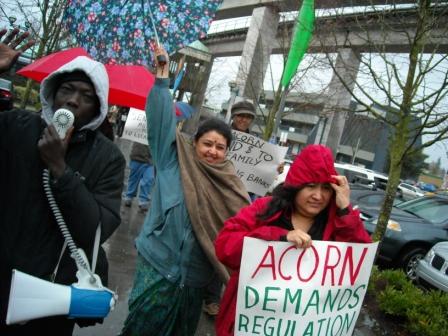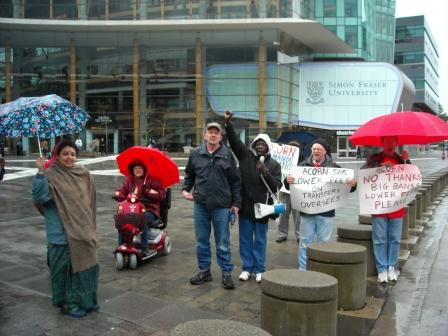Your cart is currently empty!
Category: Remittance Justice
-
Support Letter from CUPW
A support letter from CUPW- the Canadian Union of Postal Workers- and it’s President joining our call for remittance regulation at the provincial and federal level in Canada. -
Article about our campaign on the Calgary News & Views
Bank fees ‘killing’ migrant workers: ACORN
‘We’re trying to end this predatory practise by the banks and financial agencies’
Published March 3, 2011 by Trevor Scott Howell in NewsAn international community-based, low-income advocacy organization is calling on the Canadian government to regulate the “predatory” remittance industry.
The Association of Community Organizations for Reform Now (ACORN) says the unregulated practise of charging up to 50 per cent for money transfers — a $400-billion industry according to the World Bank — is punishing migrant workers and immigrants, many of whom send money to their families back home.
“The remittance fee is killing us,” says Kay Bisnath, president of ACORN International. “Migrant workers’ and immigrants’ families depend on the money that their loved ones in Canada and around the world send to their homeland.”
Bisnath says banks and money transfer businesses can charge as much as 50 per cent in remittance fees. A migrant worker sending $100 to their family can be charged between $32 and $35 through the TD Bank, says Bisnath. “When you have to pay all these remittance fees, what are the loved ones left with?”
ACORN is calling for the Canadian government to limit the amount banks and financial institutions can charge to five per cent.
“We’re trying to end this predatory practise by the banks and financial agencies,” says Bisnath.
-

Progress made with demands in Vancouver, BC
13 Members braved the rain and storm and marched to meet the CEO of the Financial Institutions Commission (FICOM). They briefly met with Carolyn Rogers the CEO to set terms of future meetings.


-
HSBC response to request for a meeting and reaction to our report “Past Time for Remittance Justice”
Mr. W Rathke, Chief Organiser
Ms. K Bisnah, President
ACORN International
P O Box 3924
New Orleans
LA 80177
USA 9 February 2011Dear Mr. Rathke and Ms Bisnah
Thank you for your letter of 3rd January 2011 addressed to Mr M Geoghegan
our former Group Chief Executive Officer enclosing a copy of your report on
remittance services. I have been asked to write to you in response given
my responsibility for our retail banking services on a global basis.We have considered your report and its conclusions with interest and fully
appreciate the impact that the costs incurred by expatriate workers in
making what may often be relatively small remittances from the US and
Canada to their home countries. It is not possible for us to comment on
the overall conclusions of your report, but I am writing to clarify the
following points in relation to our activities in the USA and Canada.
These are:-§ We do not have a large geographical footprint in either country. In
the USA we have 482 branches largely located in New York State, New
York City and in a small number of major urban centres. This
compares to circa 6,000 for the 3 largest banks. Similarly in Canada
we operate 145 branches based principally in Vancouver and again in
the main urban centres compared to over 1,000 for the top 5 Canadian
Banks..§ We are subject to stringent regulatory requirements, particularly
those relating to Anti-Money Laundering; Counter Terrorist Financing
and compliance with economic sanctions, including those promulgated
by the US Office of Foreign Assets Control. As a consequence, we
have decided that it is neither permissible nor appropriate for us to
offer services to non-customers. Accordingly we are only able to
support customers who maintain an account with us. In our experience
this often means that customers who only require occasional
remittance services are likely to prefer to use the services of
specialist providers. We do believe that any further research you
carry out should assess the impact of these regulatory requirements
and expectations. Many of the countries you refer to as the
destination for remittances are also viewed as carrying high risk for
money laundering activity. Remittance services, including products
such as stored value card are viewed as carrying potential high risk
of money laundering.§ Given the nature and scale of our Retail Business, we have concluded
that developing a large scale remittance business is not a priority
for our Group. Indeed it is notable that based on your own research
the specialist remittance services providers are able to operate the
most cost-effective services from a customer perspective.We hope the above helps and clarifies some of your report’s findings.
Yours sincerely
Kevin Newman
Head of Retail Banking -
Remittance Meeting in Ottawa Today
Remittance meeting on February 22nd at 6pm.
On Tuesday February 22nd at 6pm, Ottawa ACORN members will be meeting at 81 Montreal Rd to strategize and discuss the upcoming March 2nd action on remittance fee reduction. The remittance justice campaign was initiated over a year ago with ACORN members fighting for regulations on remittance costs. The rally on March 2nd at 12pm which members are organizing for, on Tuesday evening, is set to take place at 427 Laurier Ave, located at Laurier and Kent. Childcare and ride services are available for all those attending. For ride services or more information on the meeting Tuesday night, please contact Ottawa ACORN at (613) 746-5999
-
Remittance Meeting in Ottawa Today
Remittance Meeting on February 22nd at 6pm.
On Tuesday February 22nd at 6pm, Ottawa ACORN members will be meeting at 81 Montreal Rd to strategize and discuss the upcoming March 2nd action on remittance fee reduction. The remittance justice campaign was initiated over a year ago with ACORN members fighting for regulations on remittance costs. The rally on March 2nd at 12pm which members are organizing for, on Tuesday evening, is set to take place at 427 Laurier Ave, located at Laurier and Kent. Childcare and ride services are available for all those attending. For ride services or more information on the meeting Tuesday night, please contact Ottawa ACORN at (613) 746-5999
-
Summary of our “Past Time for Remittance Justice” Report
Remittances, which begin as simple financial transfers from an immigrant or a migrant worker thousands of miles away to their families back home, are not only lifeblood to their relatives and communities in the home country, but also are frequently critical to the entire national economy of whole countries. According to the Inter-American Development Bank remittances are a significant component of many developing countries’ GNP and far outstrip inputs of foreign aid or private investment from other countries.
Over and over, the countries where ACORN International members and partners live come up high on the list of remittance beneficiaries: India, Mexico, Honduras, Dominican Republic, Kenya, Philippines and Korea, especially. This matters to us in a deeply personal and very national way in both our home countries and our adopted countries where we have family. Clearly, remittances are valuable to immigrant families and their relatives. There are many developing countries where a primary export is migrant labor and a critical import is remittance dollars. Yet, central banks and global financial institutions seem impotent in the face of money transfer organizations and banks.
ACORN International has come up with a remittance grid which shows the costs that are attached to sending money overseas. We found that most of these costs are hidden, some even unavailable to the general public. We focused on ten (10) countries in which ACORN International has head offices and/or we are partnered with. We chose several major institutions of both the United States and Canada and gathered data on what costs are attached to sending a $100 remittance from Toronto, Canada or New Orleans, Louisiana, in Canadian and American Dollars respectively to the ten countries where we work. We choose $100 because it is most common according to both our members and outside studies.
Following our research, the cost of sending (often excluding pick-up costs) the 100 dollars varies depending on type of transfer speed and delivery options. Some institutions have extra costs attached such as “communication” or “processing” fees. There is also an exchange rate charge where the individual institutions profit after the 100 dollars is sent when they exchange the Canadian or American dollars into the currency appropriate for the recipient country. This is calculated by subtracting the institution’s exchange rate from the general exchange rate. Sometimes the difference is not much. At other times however, the cost is quite steep, especially when in conjunction with the other costs involved.
A dramatic example from our investigation is Bank of America: To send US$ 100 to Kenya with Bank of America, it can cost US$ 45 transfer fee + US$ 16 pick-up fee. On top of this, the sender could lose $13 from the remittance due to the exchange rate. So the immigrant or migrant worker is paying almost $75 to send US$ 25 back to their families at home.
ACORN International has concluded that to advance remittance justice and citizen wealth for our members we need the architecture of a three pronged effort:
(1) Transparency: We have exposed the real costs and fees in as clear a manner as possible so that there is no question of the predatory nature of the enterprises and how various actors played their roles in thwarting fair and just pricing.
(2) Regulation: We have to determine why such institutional anarchy exists. Is there any force to global financial bodies like the World Bank or International Monetary Fund or G8 and other deliberations? And, if so, can it be applied to remittances for immigrant families and migrant workers? If global institutions are inadequate, what is the role, if any, being played by national central banking institutions in either developed or developing countries or their states and provinces? How can we get movement for accountability, regulation, and reform?
(3) Pressure: We and our partners have to encourage and enforce negotiations, pursing both agreements with institutions and the promulgation of policies and programs wherever possible with regulators to achieve reform.
